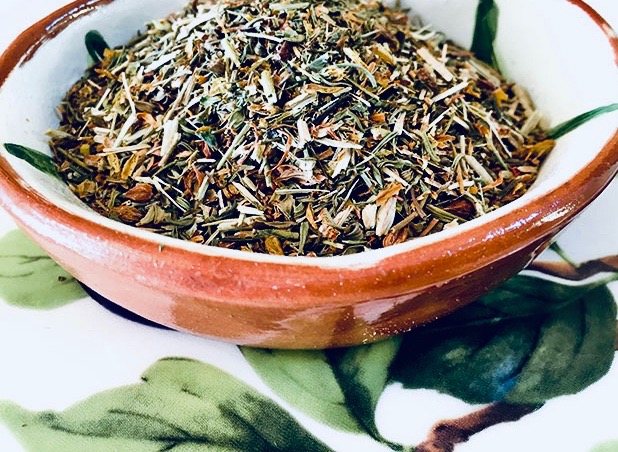St. John’s Wort Cures Our Body and Mind

Herbal tea is a tasty, low-calorie drink that can be enjoyed while unwinding alone, socializing with friends and family, or celebrating special occasions. Yet, the plant carries a myriad of health and well-being benefits too. Studies have shown that thanks to its bioactive ingredients, tea can help refresh, hydrate, heat up or cool down the body, and improve mood.
St. John’s Wort (Hypericum perforatum), is one of nature’s finest antiseptics, and deserving of its reputation as a calming and soothing herb. For centuries, the plant has been cultivated from the wild and used as an at-home remedy, for various ailments and conditions.
First Things First
Thanks to its anti-inflammatory and vulnerary properties1,2, St. John’s herbal oil stimulates regeneration and healing, and is used as a remedy for minor cuts, scrapes, or burns; it also reduces the appearance of scars, old and new. Rubbing just a few drops of the oil into the skin using small, circular motions helps relieve the pain associated with injuries, gout, or nerves.
Traditionally, herbal tea has been taken as a home remedy for digestion disorders, anxiety, depression and sleeping aid. It is believed that St. John’s Wort calms the brain and helps induce sleep by enhancing the inhibitory activities of gamma-aminobutyric acid (GABA), via a mechanism similar to Valium, but without the potential for dependence.
When treating depression of mild to moderate severity, findings in several studies have presented remarkable results: St. John’s Wort was shown to be more effective than a placebo, and as effective as some standard antidepressants.3
In Germany, the plant is currently among the most prescribed antidepressants, both natural and synthetic.4
A possible explanation for its effectiveness may be its mechanisms of action – the herb increases the levels of key neurotransmitters in the brain (serotonin, dopamine, and noradrenalin) whilst simultaneously lowering levels of cortisol, a stress hormone.5 As with many synthetic antidepressants, it can take 6 to 8 weeks of continual use for the plant to take full effect in the treatment of anxiety and depression. Regarding the side effects of St. John’s Wort, known symptoms include headache, fatigue, photosensitivity, and dry mouth.
Drug Interactions
St. John’s Wort speeds up the elimination of other ingested medications, thus making their effects weaker. In treatments where single doses are important (such as digoxin, warfarin, birth control pills, oxycodone, cyclosporine, etc.), concurrent consumption can adversely affect your health.6
Furthermore, combining St. John’s Wort with other antidepressants can lead to serotonin syndrome, a potentially life-threatening condition caused by excessive levels of serotonin in the body. Always seek medical advice before adding St. Jon’s Wort to your diet and/or treatment.
If you just need something to lift your spirit, ease the symptoms of menopause, PMS, or mood swings, or just help you unwind after a stressful day, a cup of St. John’s tea may be the answer. You can drink up to 2 cups a day, alone or in combination with other herbs – such as a pinch of valerian – to improve its sedative effects. But, as with all herbal and medicinal remedies, mind the cumulative effect of the habitual tea drinking and don’t use it too often nor too much.
Note: It is very important not to treat depression on your own. If you are making any changes to your mental health routine, always seek advice from a medical professional.
By TAMARA GRLJA, MSc Medical Biochemistry
References:
1.Tedeschi, E. (2003). Anti-Inflammatory Actions of St. John’s Wort: Inhibition of Human Inducible Nitric-Oxide Synthase Expression by Down-Regulating Signal Transducer and Activator of Transcription-1 (STAT-1 ) Activation. Journal of Pharmacology and Experimental Therapeutics, 307(1), 254–261.
2. Schempp, C. M., Winghofer, B., Lüdtke, R., Simon-Haarhaus, B., Schöpf, E., & Simon, J. C. (2000). Topical application of St John’s wort (Hypericum perforatum L.) and of its metabolite hyperforin inhibits the allostimulatory capacity of epidermal cells. British Journal of Dermatology, 142(5), 979–984.
3. Linde, K., Berner, M. M., & Kriston, L. (2008). St John’s Wort for major depression. Cochrane Database of Systematic Reviews.
4. Fegert, J. M., Kölch, M., Zito, J. M., Glaeske, G., & Janhsen, K. (2006). Antidepressant Use in Children and Adolescents in Germany. Journal of Child and Adolescent Psychopharmacology, 16(1-2), 197–206. doi:10.1089/cap.2006.16.197
5. Butterweck, V. (2003). Mechanism of Action of St John’s Wort in Depression. CNS Drugs, 17(8), 539–562.
6. Mills, E., Montori, V. M., Wu, P., Gallicano, K., Clarke, M., & Guyatt, G. (2004). Interaction of St John’s wort with conventional drugs: a systematic review of clinical trials. BMJ, 329(7456), 27–30
7. 2010. Serotonin syndrome/toxicity – a reminder. Prescriber Update, 31(4): 30-31





